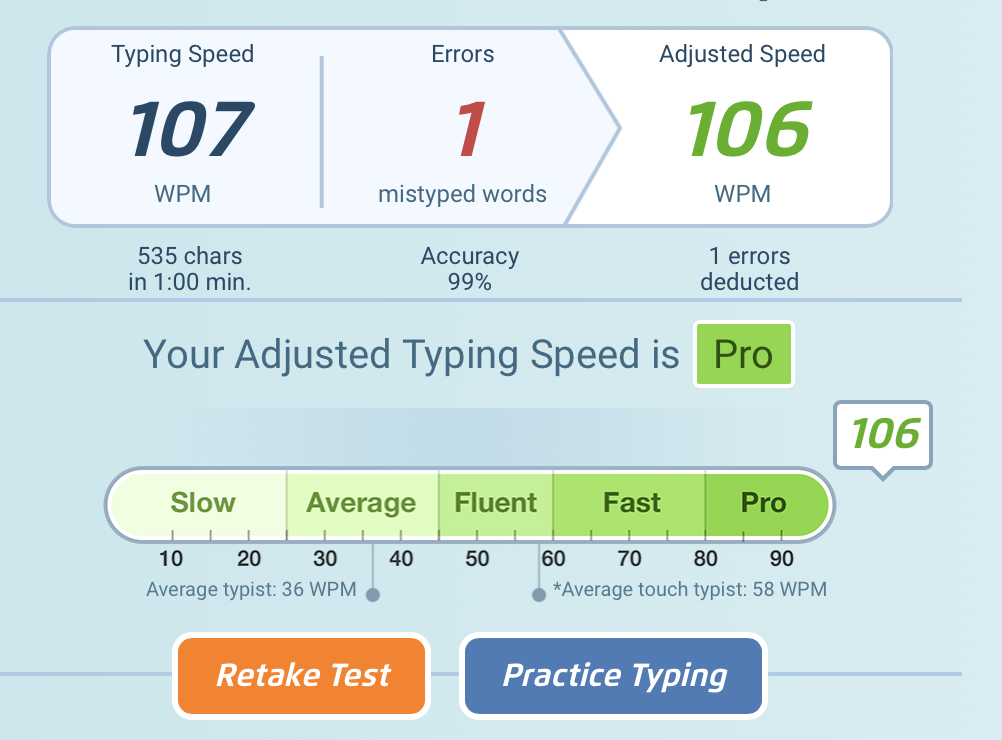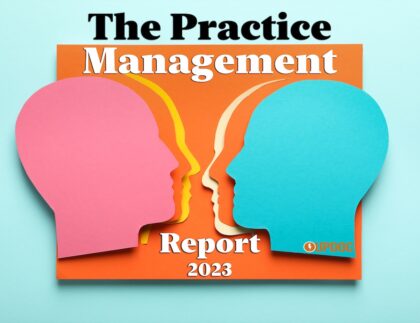
There has been a growing level of attention in healthcare to the competency of administrative and clinical support staff. For Physical Therapy and the greater community of allied rehab therapy, this is no exception. After all, your reception team and/or front desk are typically responsible for receiving inbound calls, queries, and are usually the first contact for any lead coming through. Being that they are your first touch point for the majority of your customers, it serves best that they also carry with them a mindset that values the business operations of the practice.
Here are the Top 5 Business Competencies for Healthcare Support Staff.
1. Words Per Minute
Believe it or not, testing candidates for technological skill sets and basic computer competency remains largely lacking for healthcare companies. Larger organizations tend to have this duty placed on team members who work in call centers. However, for front desk staff, administrative assistants, and patient care coordinators… this remains rarely checked.
The best test to gauge Word Per Minute (WPM) using a typing test. There are plenty of free online based typing tests out there. But, before we share that… let’s just take a look at what certain WPMs actually look like.
—60 WPM—
—100 WPM—
Ultimately, what 30 WPM vs. 6 WPM vs. 100 WPM gets you is efficiency at the touch of one’s finger tips — LITERALLY. It also makes the difference of needing to hire 2 or 3 FTEs versus 1 or 1.5 FTEs due to the time saved compounded over hundreds of emails, messages, documentation tasks, scheduling tasks, etc. So, when you think about the cost savings that occur when your non-clinical support staff are on keys, the advantages start to stack up and simultaneously opens up time for support staff to take on duties that can free up time for managers.
PS. If you’re looking for a free online typing test, check this one out: TYPINGTEST.COM
PPS. Here were my results, going easy… 😉

So, ultimately, what you might want to consider is making at the minimum — 50 or 60 WPM as a baseline qualifier for your staff and future applicants. Typing is a valuable skill as it SAVES TIME. And, time being a vehicle for value, will create compounding benefits for your business unit. And, if your current staff isn’t up to “Fluent” or “Fast” speeds, this site and many like it offer free trainings to get folks “up to speed,” literally! #DadJoke
2. Online Research
As we all know too well: The ability to perform quick, efficient, and ACCURATE online research can become more complicated than it sounds.
After all, what’s so hard about Googling a simple phrase or term? It’s not just the search function, it’s also knowing what strings of text to best use, which iterations to try and which ones to leave out, which tabs to open and which to ignore, and what overall impression based on the search results are best given as an executive summary to the management team. All of this requires time and efficiency, otherwise… it can be easy for support staff team members to find themselves down some really deep and unrelated rabbit holes.
Online Research comes in handy when it comes to obscure medical procedures, diagnoses, new standards for clinical care pathways, market research, payer research, regulatory updates, pre-qualifying new hire applicants… the list goes on.
Perhaps a philosophical parallel to why the skill of Online Research is so important is that this competency reveals not just the capability of finding accurate information, it also shines a light on the posture of a person and how they regard learning, seeking knowledge, and making meaningful sense based off a sampling of answers that may or may not all be accurate.
3. Messenger Apps
Over 70% of people prefer a text message to a live phone call. When compared to the option of adding email t the mix, 85% of customers prefer receiving text messages over a phone call or email regarding “no-action-required” informational notifications.
The ability to connect with people on their preferred channels of communication has become our new societal norm. We use all sorts of channels and apps such as SMS, WhatsApp, Facebook Messengers, Instagram Messages, LINE App, WeChat, NextDoor, Twitter, Snapchat, Linked In, Slack, Google Hangouts Chat… the list literally goes on and on. This competency is a strong one to highlight as it gives the management team hints as both how tech savvy a support staff team member is, but also how willing they are to explore new platforms.
Here’s an experiment for you: Ask your team to install a chosen messenger app via an SMS invite and reply via given app and user code/ID. Then, for the remainder of the day, use this platform to communicate with that chosen team member for the majority of required tasks.
What the above task tests for the support staff member is the competency of using multiple features and functionalities on a mobile device; it tests their skill in connecting over platforms, each which have different social inferences, innate tones of voice, etiquettes, etc.
Ultimately, it’s worth noting that fluency with messenger apps and typing speed is also a great competency for clinicians as many practices are increasingly encouraging providers to directly connect with patients via secure email, EMR app messages, and secure chat apps.
4. Social Channels Analysis
Here’s the test: Have a support staff team member find a company along with a specific team member of that company — it could be yours. Their aim is to deliver a 2 – 3 sentence executive summary based on their impressions of the company and individual employee’s social channels.
Support staff are often the best catalysts to a marketing team’s efforts because they are the first point of contact and are boots on the ground for their brick-and-mortar locations. While they shouldn’t necessarily be tasked to take on marketing competencies, they should be positioned in a collaborative fashion to help augment and receive the efforts of the marketing team, vendor, or agency. Most commonly, it’ll be a support staff team member who will be capturing candid images, B-roll footage, documenting patient success stories, and recording testimonials or interviews — with the appropriate wavers fulfilled, of course 😉
It is also key for support staff to be involved in social media communications as they are likely doing this at the front desk, via email, and through phone calls. As such, they can assist management and marketing by keeping an eye out for the positives and negatives online reputation management — even preventing PR crisis through early opportunities in identifying service recovery options.
5. Customer Relationship Management
This final competency might seem to be once against stepping on the toes of the marketing team. However, as with the above sections, the goal of support staff in this instance is to be involved in a way that mirror’s the marketer’s roles and efforts. As new customers call in, schedule, and walk through the front doors, your support staff team members are in a prime position to help close the loop on inquiring, tracking, and identifying the inbound customer narrative pathway — in how newly shopping consumers become paying customers.
Task your support staff team member to open, create, and send an email campaign from a freemium CRM platform (such as MailChimp). Issue them a small spreadsheet of about a dozen contacts and give them liberties to send a one-off email in any way they see best fit.
The goal of this test is to assess your team member’s instinctual attention to detail, understanding of copywriting, visual composition, and audience segmentation. While all these things on an outbound wavelength should be tasked to the marketing department, your support staff will be the ones who will be receiving the leads, nurturing phone calls, responding to email and website message inquiries, chatting with queries on social media messengers, etc.
Ultimately, the aim for support staff involvement in CRM is on the sales side.
How are they tracking inbound calls, emails inquiries, website chats, and social media messages? What are they marking for new calls, walk-ins, or new patients upon intake? These data points are critical as they help management teams better connect the dots between marketing efforts and what is occurring along the pathway towards the front door and through a course of care. And, it will be your support staff that will likely be the point of contact for new patient phone calls, they will be the one to connect with someone who is at risk of falling off, and will also be the voice across the airwaves in nurturing leads who might be initially tentative to schedule their first appointment.
Good CRMs will help support staff track these customers, schedule touch points and calls, and if need be, help the marketing team update algorithms for internal automation, narrative, or even identify emerging segments to the practice.
Some Closing Thoughts
The purpose of support staff in healthcare is to catalyze operational efficiency for clinical providers and boost meaningful productivity for management teams.
All too often in healthcare, managers are hesitant to delegate operational tasks to support staff and tend to identify a clinical lead to take on administrative roles that would be better suited for an administrative assistant or clinical care coordinator. Similarly, support staff are often underutilized in regards to customer relationships and marketing efforts — leading to a mindset-disconnect when it comes to coupling marketing data with their sales methodologies… even seeing their roles as very much separate from sales and simply relegated to duties of processing queries and scheduling appointments.
Over this Summer, I’ve had a lot of individuals in practice ownership and management roles ask me about my opinions on what qualities are best suited for support staff or administrative/coordinator roles. While this varies from practice to practice, the consistencies remained the same: (1) technological savvy, (2) a consummate understanding of the customer conversion journey, and (3) a personality that takes initiative in augmenting the efforts of the clinical staff, the marketing team, and their management — seeing no job as below them, beyond them, or not part of their immediate concern or part in the team… because it ALL matters to them.









